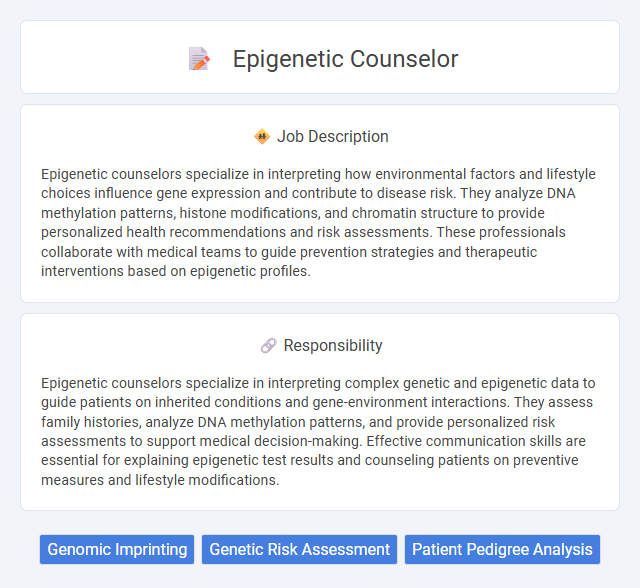
Epigenetic counselors specialize in interpreting how environmental factors and lifestyle choices influence gene expression and contribute to disease risk. They analyze DNA methylation patterns, histone modifications, and chromatin structure to provide personalized health recommendations and risk assessments. These professionals collaborate with medical teams to guide prevention strategies and therapeutic interventions based on epigenetic profiles.
Individuals with strong analytical skills and a compassionate nature may be well-suited for an epigenetic counselor role, given the job's requirement to interpret complex genetic information and provide emotional support. Those who possess a background in genetics, biology, or healthcare might find the position aligns with their expertise and interests. Candidates who thrive in patient-centered environments and enjoy continuous learning could probably excel in this specialized counseling field.
Qualification
Epigenetic counselors require a strong foundation in genetics, molecular biology, and clinical counseling, typically holding a master's degree in genetic counseling or a related field. Certification from recognized boards such as the American Board of Genetic Counseling enhances credibility and job prospects. Expertise in interpreting epigenetic test results, patient communication, and ethical considerations is essential for effective counseling and personalized patient care.
Responsibility
Epigenetic counselors specialize in interpreting complex genetic and epigenetic data to guide patients on inherited conditions and gene-environment interactions. They assess family histories, analyze DNA methylation patterns, and provide personalized risk assessments to support medical decision-making. Effective communication skills are essential for explaining epigenetic test results and counseling patients on preventive measures and lifestyle modifications.
Benefit
Epigenetic counselors likely offer significant benefits by providing personalized risk assessments based on gene-environment interactions, which may improve preventive healthcare strategies. Their guidance could enhance patient understanding and management of inherited and environmental factors influencing gene expression. This specialized support might increase the accuracy of disease prediction and facilitate tailored interventions for better health outcomes.
Challenge
Epigenetic counselors may face significant challenges in interpreting complex genetic and environmental data accurately to provide personalized risk assessments. The rapidly evolving nature of epigenetic research could create uncertainty, making it difficult to offer definitive guidance to patients. Effective communication of probabilistic outcomes and managing patient expectations might also present ongoing difficulties in this specialized field.
Career Advancement
Epigenetic counselors specialize in interpreting gene expression changes influenced by environmental factors and lifestyle, providing personalized healthcare insights. Career advancement in this field involves gaining expertise in molecular biology, genetics, and counseling, often leading to roles in research leadership, clinical coordination, or genomics consultancy. Pursuing certifications from organizations like the National Society of Genetic Counselors (NSGC) and engaging in continuous professional development enhances prospects for senior positions and interdisciplinary collaboration.
Key Terms
Genomic Imprinting
Epigenetic counselors specialize in interpreting genetic data related to genomic imprinting, a process where gene expression is determined by parent-of-origin epigenetic marks. They provide critical guidance on imprinting disorders such as Prader-Willi syndrome and Angelman syndrome, enabling risk assessment and personalized management plans. Their expertise helps bridge the gap between complex epigenetic mechanisms and patient-centered genetic counseling.
Genetic Risk Assessment
Epigenetic counselors specialize in genetic risk assessment by analyzing how environmental factors influence gene expression without altering DNA sequences. They interpret epigenomic data to evaluate hereditary disease risks and guide personalized preventive strategies. Their expertise supports patients in understanding complex gene-environment interactions affecting health outcomes.
Patient Pedigree Analysis
Epigenetic counselors specialize in patient pedigree analysis to evaluate hereditary patterns and epigenetic modifications influencing disease risk. They integrate family health histories with molecular data to identify potential epigenetic markers and guide personalized intervention strategies. This role demands proficiency in genetic data interpretation, counseling skills, and knowledge of epigenomic technologies to support clinical decision-making.
 kuljobs.com
kuljobs.com